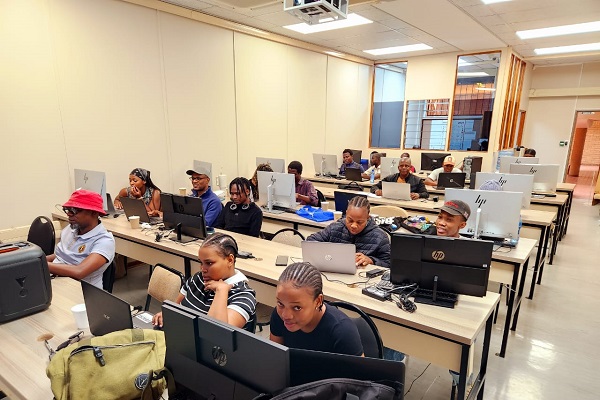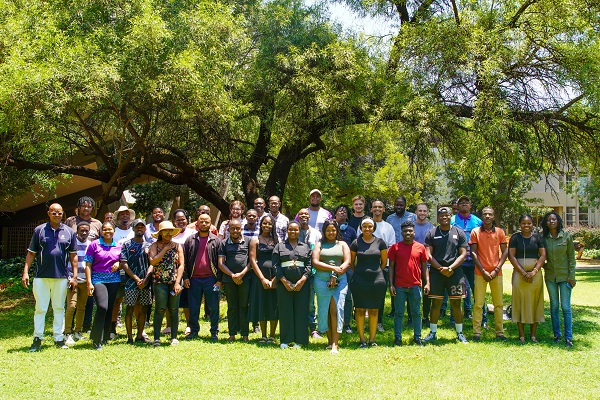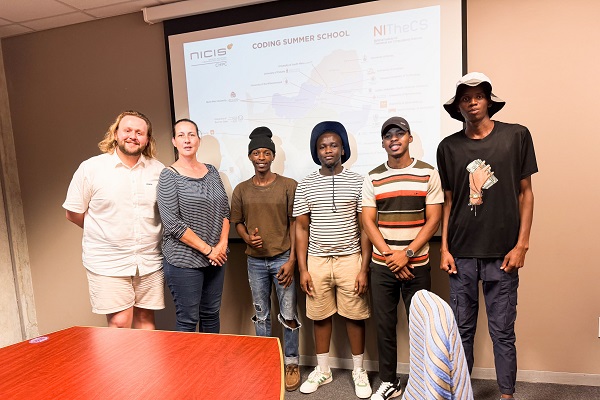Over the past two weeks, from 27 January to 7 February, registered postgraduate students from the North-West University (NWU), alongside other participants from across the Southern African Development Community (SADC), engaged themselves in the fields of data science and computational thinking. In a world of data-driven decision-making, they acquired vital skills that will influence their futures.
Now in its 15th year, the Centre for High Performance Computing (CHPC) Coding Summer School – held in collaboration with the National Institute for Theoretical and Computational Sciences (NITheCS) – focused on “Foundations of Data Science and Computational Thinking”. This initiative aimed at training researchers in the fundamentals of scientific computing and data science.
The school, which was accommodated across all three campuses of the NWU and at various universities and research sites across the country, offered a comprehensive programme comprising daily lectures, interactive code-along tutorials and hands-on assignments. Furthermore, esteemed professionals from diverse science, technology, engineering and mathematics (STEM) disciplines delivered insightful presentations. At the conclusion of the programme, qualified participants were awarded certificates of completion.
Dr Daniel Mojalefa Moeketsi, senior lecturer at the School of Physics and Centre for Space Research at the NWU, underscored the significance of this initiative. He said, “This summer school not only empowers students to effectively utilise high-performance computing resources but also enables them to tackle complex data challenges in their respective fields.”
He further emphasised: “In addition to enhancing individual expertise, this training drives the overall growth and innovation of computational sciences in South Africa. Its relevance extends to both the Fourth Industrial Revolution(4IR) and the emerging Fifth Industrial Revolution (5IR) due to its focus on computational skills, data science and artificial intelligence.”
The curriculum was structured to provide an in-depth learning experience. The first week focused on essential topics such as data science with Pandas, Python best practices, workflow management, and extract, transform and load (ETL) processes. In addition, students studied exploratory data analysis (EDA) and the fundamentals of Bash scripting. Building on this foundation, the second week saw the students exploring machine learning, artificial intelligence, probability theory, statistics and computational thinking.
The summer school attracted 76 students across the NWU’s three campuses: 36 from the Potchefstroom Campus (comprising 20 local students and 16 from the Development in Africa with Radio Astronomy (DARA) project), 37 from the Mahikeng Campus, and five from the Vanderbijlpark Campus.
Reflecting on his experience, Donovan Rooi, a PhD student in Health Sciences, expressed his enthusiasm: “As a student from the Faculty of Health Sciences, I was unsure about attending, but I can confidently say that participating in this coding summer school was a great decision. The
content was delivered in a clear way with practical examples for every topic. My Python coding and computational thinking have grown beyond theoretical work, and I can now proudly attempt solving real-world public health challenges. I am grateful for this opportunity.”
Similarly, Kgaugelo Ledwaba, a BSc Honours student in Physics, highlighted the impact of the programme on his academic journey: “The skills, techniques and insights gained will enhance my research. I particularly enjoyed the code-along sessions and team-building exercises, which not only extended my knowledge but also facilitated meaningful engagements with fellow participants.”

The young minds were lit up by the possibilities of data science on the Mahikeng Campus.

Students on the Potchefstroom Campus.
 The participating students in attendance on the Vanderbijlpark Campus are, from the left, Luke Coetzee (junior lecturer at the School of Computer Science and Information Systems), Tanja Eksteen, Katleho Tsotetsi, Leemisa Moleko, Karabo Khumalo and Mzukisi Soboyisa.
The participating students in attendance on the Vanderbijlpark Campus are, from the left, Luke Coetzee (junior lecturer at the School of Computer Science and Information Systems), Tanja Eksteen, Katleho Tsotetsi, Leemisa Moleko, Karabo Khumalo and Mzukisi Soboyisa.